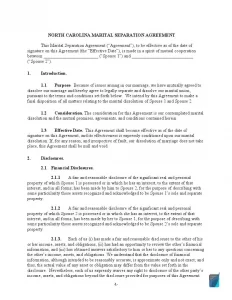North Carolina Marital Settlement (Divorce) Agreement and Legal Separation
Lack of information about the laws creates challenges during many everyday activities. Even a wedding or divorce requires you to know your rights and responsibilities. We have collected essential information about the divorce-related laws in North Carolina and, based on that information, presented a comprehensive report about the North Carolina Marital Settlement Agreement Form. This article is helpful for people who are currently going through a divorce or separation procedure or are preparing to do so.
The statutes for separation differ in various US states. Some states’ authorities do not require any grounds for divorce, while others do not permit divorce without reason. Therefore, you are advised to explore all details of this complicated process in your area. This review will introduce you to the main features of the annulment of marriage in the state.
Marriage dissolution is an expensive and long-lasting activity for every couple. The main problems a parting couple can face are ownership distinction and determination of rights over shared children. We suggest completing the marital agreement to solve these delicate issues painlessly. North Carolina authorities do not obligate spouses to provide this form, but most couples use it to make the separation faster and easier.
There are two approaches to accepting the Marital Settlement Agreement: by spouses or by a lawyer to perform all legal procedures regarding the separation process. It relies on the partners’ ability to compromise. If neither party is satisfied with the divorce conditions, they can request help from family law specialists. Attorneys help people avoid communication with their previous life companions.
The main advantages of completing a marital agreement in North Carolina are as follows:
- Reduced expenses and duration of court proceedings
- Protecting personal relations between the partners by avoiding controversial situations and ambiguity
- Minimizing the duration of court trials
- Determining conditions to be observed after the divorce process
Being a party to a legal proceeding, you may want to get fair rights for the property and children after separation. However, judges do not always distribute duties and benefits equally between spouses due to external and internal conditions.
Please remember that no one can force you to sign the agreement or alter its contents without consulting you. The main point of this document is to simplify further life and relationship between former life partners.
It is advisable to seek legal assistance and hire an attorney even if you can fill out the agreement yourself. The thing is, post-marital agreements are pretty complicated, and the possibility of making mistakes is high. An attorney can check the form for any legal inconsistencies and help you create a correct document for a court trial.
North Carolina Divorce and Separation Laws
The North Carolina Marital Settlement Agreement (or Separation Agreement) compilation procedure is regulated by Chapter 50 of the state’s General Statutes. Let us introduce you to its main points and ideas.
Grounds for Divorce
You can file for divorce in North Carolina only if you are in one of these situations:
- One year of separate residence with a spouse
- Either spouse has had an untreatable mental disorder for three years or more.
The above conditions are lawful considerations to dissolve the marriage in North Carolina. If your situation matches these, you can request divorce following Sections 50-6 and 50-5.1 of the Statutes. Absolute termination of marriage is not permissible in any other situation.
There is an alternative way of separation in this state (look into “Divorce from Bed and Board” for more info on relevant cases). Spouses will not get an absolute termination of the marriage in this case, but they can claim for intention to divorce. The significant circumstances for such a separation can be disagreements or the fault of one of the partners. There are several criteria for creating and filing a DBB application:
- Violence and cruelty towards the household members
- Infidelity (alleged or proven)
- Extreme intake of drugs or alcohol
- Neglect of family and its values
- Intentional expulsion of the household members from their home
- Creating unbearable living conditions
Once the husband or wife chooses to leave the spouse under the conditions listed above, they need to collect reliable evidence. The court may find these pieces of evidence trustworthy and allow partners to be separated. In a year, they can request absolute marriage dissolution, and they will not have any relationships after that. DBB allows the victim to get alimony payments before the divorce.
One of the partners must have resided in North Carolina for at least six months for the divorce case to sail through.
Property Division
The court will split all the joint property equally between spouses following the statutes of North Carolina. Therefore, everything acquired by the spouses after the wedding and before the separation is split in equal measure. However, gifted properties and legacy assets are exempt from this rule.
Child Custody and Visitation
You can establish the requirements regarding shared or unilateral custody for the child of the marriage in the settlement agreement. However, ensure you set the terms that will be beneficial for the child in the first place. Otherwise, the court will make amendments to your marital agreement to serve the interests of the minor.
You can leave the section about custodian for minor children blank and modify the agreement after the divorce. The judge will revise their verdict subject to special conditions or alterations. Favoring the child will be a critical point in any accepted judgment.
Child Support and Alimony
There is a unique approach to calculating the amount needed to support a child based on parents’ earnings and essential services costs. A child needs to get medical care, education, and other things influencing their upbringing and socialization. Parents must pay for child support until they are 18 years old or finish high school.
There are no restrictions about the alimony payments in the statutes of North Carolina. Therefore, the court can even refuse to assign alimony to the spouses. A spouse might be given maintenance only when they prove that their budget is limited and income is insufficient for child support. In most cases, when partners have approximately equal budgets, the court will not award alimony at all.
It is hard to determine the exact amount you will need to spend on your child’s support in advance. The court considers all families individually. Pay attention to Section 50-16 of the Statutes for more details.
Popular Local Marital Settlement Agreement Forms
A divorce settlement agreement, often known as a separation agreement, is a great document that might enable you to work out the divorce proceeding and reduce undesired hassle. Here are the states the residents of which look for this form the most.
Legal Separation
Legal separation is different from divorce. While the separation is more of a pre-step, the divorce is absolute marriage termination. After the legal separation, partners can live in different residencies, but they cannot avoid division of ownership and rights for a child’s upbringing. Since the marriage is still active after the legal separation, partners cannot remarry or sign the official papers as “single.”
Unlike other US states, North Carolina laws do not permit spouses to request legal separation. Instead, there is a possibility to claim for the DBB described above. Spouses can have separate residencies and avoid joint expenses yet still be legally married. Usually, people choose this option when their religion or other believes do not allow them to dissolve the marriage.

Filing for Divorce in North Carolina
Here is a tutorial containing the divorce procedure in North Carolina. First, let’s calculate the amount of money and time you need for the termination process.
The mandatory payment for the court operations in this state is $225. You can hire an attorney to solve all legal matters in advance, which is an additional expenditure. It is not obligatory to attract a lawyer to the divorce process, but they will facilitate the marriage dissolution and increase the probability of a successful divorce.
The court will analyze your request within 45 business days. Some exceptional circumstances may expand the period of decision-making. Then, you will need to file the paper with your District Court to finish the divorce process.
Next up, we will review the steps one should take before proceeding to file.
1. Separate from Your Partner
As written above, North Carolina Statutes permit divorce only after the partners have lived separately for a year. Therefore, the court will request evidence that your residencies were different for no less than one year. If you want to claim for DBB, there is a different procedure to follow.
2. Set the Rules and Limitations with a Lawyer (optional)
To avoid unfair division of the ownership or assignment of requirements, it is advisable to form the marital agreement before the divorce. You may not be satisfied with the court’s judgments, so prepare your conditions of the marriage termination in advance. An attorney will help you complete the agreement and fix possible mistakes in the legal document. Even though this stage is not obligatory, creating the agreement with a lawyer’s assistance will speed up the marriage dissolution procedure.
3. Gather the Requested Documents
Once you check the compliance with the state laws and are ready to break your marriage, you can appeal to the family court. Prepare the papers listed below before visiting legal organizations:
- Domestic Civil Action Cover Sheet
- Civil Summons
- Complaint form
- Service Members Civil Relief Act Affidavit
- Receipt for a mandatory fee
4. Provide Notification of Defendant
The court requires you to notify the respondent (non-submitting party) about the divorce and give them 30 days to decide. You cannot inform the opponent about the dissolution or separation yourself. Instead, you should choose one of the alternatives below:
- Certified mail
- Publication in a local newspaper
- Acceptance service
- Hire a local Sheriff for $30 to do that.
We suggest you rely on the knowledge about your spouse’s current residence and available budget while choosing the notification method.
5. Go to the Court Hearing
Both spouses must attend the court on the hearing date at the designated time. You can learn the date from the court secretary and inform the opponent about it. Do not forget to file the Notice of Hearing and Judgment of Divorce to the secretariat. The judge will provide you with confirmation of the divorce after the announcement of the decision.

Consider our document maker to customize any form found on our site to your requirements. Here’s a range of other fillable North Carolina forms we provide.
Other Marital Settlement Agreement Forms by State